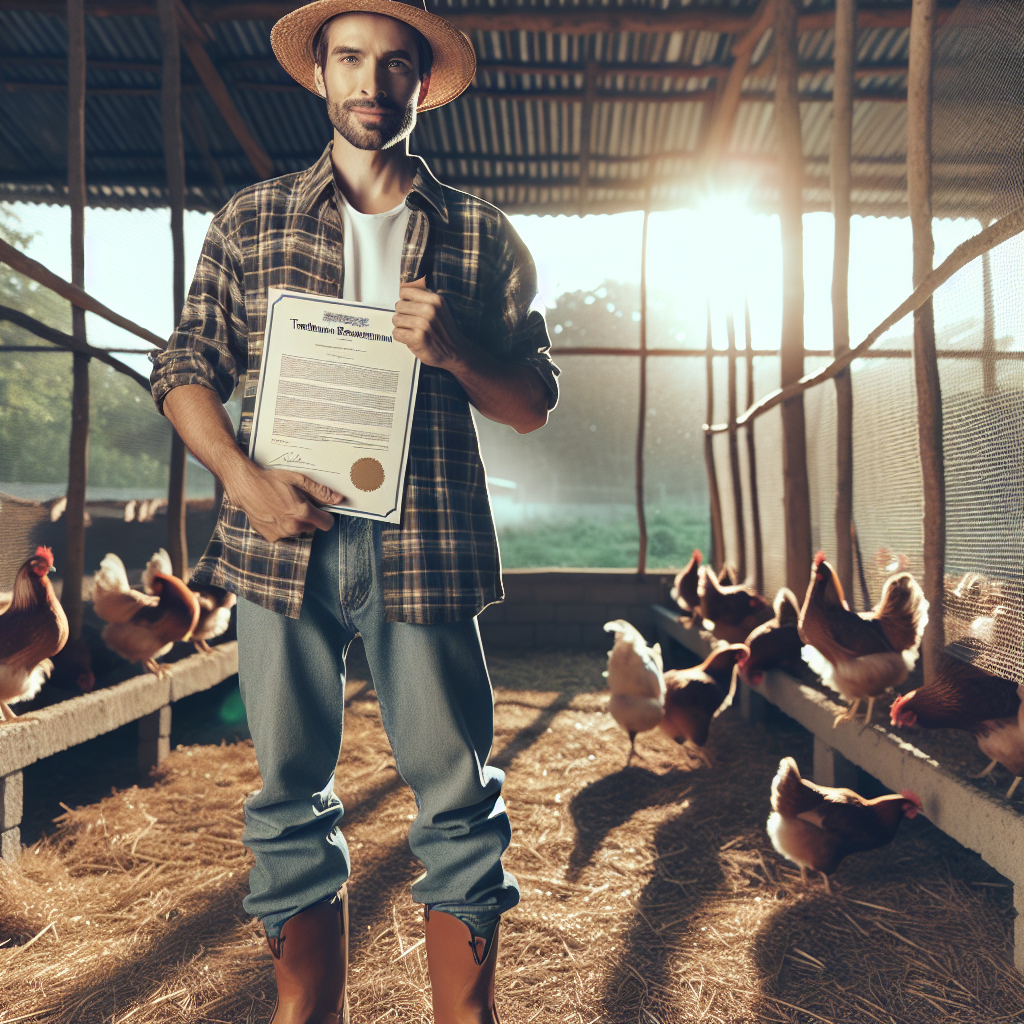If you’re considering venturing into the world of poultry farming, it’s natural to have questions about navigating the complex web of business regulations. Fortunately, you don’t have to navigate this journey alone. There are numerous resources and organizations available to provide guidance and support every step of the way. From government agencies specializing in agriculture and livestock to industry associations and community networks, you have a wealth of options to help you understand and comply with the necessary regulations. By tapping into these valuable resources, you can ensure a smooth and successful entry into the poultry farming industry. Yes, there are several resources and organizations available to guide you in navigating the business regulations of poultry farming. These entities aim to provide assistance, support, and resources to help poultry farmers understand and comply with the necessary rules and regulations. Whether you are a new or experienced poultry farmer, these resources can be extremely valuable in helping you operate your business successfully and efficiently.
Government Agencies
Department of Agriculture
The Department of Agriculture (USDA) is a vital resource for poultry farmers. They offer various programs and services to support farmers in their operations, including guidance on regulations, research and technical assistance, and access to funding and grants. The USDA can provide valuable information on topics such as poultry health, animal welfare, market trends, and much more.
Environmental Protection Agency
The Environmental Protection Agency (EPA) plays a crucial role in regulating environmental standards in poultry farming. They provide guidance on the management of animal waste, water quality, air emissions, and other environmental aspects associated with poultry production. By consulting with the EPA, you can ensure that your farm is in compliance with all environmental regulations and minimize any negative impacts on the environment.
Food and Drug Administration
The Food and Drug Administration (FDA) regulates the safety of poultry products for human consumption. They oversee the use of antibiotics, food labeling requirements, and the prevention of foodborne illnesses. It is essential to stay updated with FDA regulations to ensure the production and distribution of safe and quality poultry products.
Trade Associations
National Poultry Improvement Plan
The National Poultry Improvement Plan (NPIP) is a cooperative federal-state-industry program that aims to prevent and control poultry diseases. They provide guidelines, training, and resources to farmers for disease prevention, control, and eradication. Joining NPIP can help you implement best practices and improve the overall health and productivity of your flock.
United States Poultry and Egg Association
The United States Poultry and Egg Association is a trade group that represents the poultry and egg industry. They offer educational programs, industry events, and resources to poultry farmers. By becoming a member of this association, you gain access to a network of industry professionals, educational materials, and updates on the latest poultry farming practices.
National Chicken Council
The National Chicken Council (NCC) is another trade association that represents the interests of the chicken industry. They provide information on industry trends, research, and policy issues that affect poultry farmers. The NCC also offers resources and support for poultry farmers, including access to market information, legislative updates, and networking opportunities.
Business Development Centers
Small Business Administration (SBA)
The Small Business Administration (SBA) is a government agency that offers support to small businesses, including poultry farms. They provide assistance in business planning, financing options, and access to training programs. The SBA can also guide you through the process of obtaining necessary permits and licenses, as well as assist with navigating government contracts.
SCORE Association
The SCORE Association is a nonprofit organization that provides free business mentoring and resources to entrepreneurs. Their volunteers, who are experienced business professionals, can offer guidance and expertise in various areas, including business planning, marketing, and finance. SCORE can help you develop a solid business plan and provide ongoing support as you navigate the poultry farming industry.
Small Business Development Centers (SBDC)
Small Business Development Centers (SBDC) are organizations that offer guidance and resources to small businesses. They provide consulting services, training programs, and access to market research and industry data. SBDCs can assist poultry farmers in areas such as market analysis, financial management, and business strategy. Consulting with an SBDC can equip you with the tools you need to run your poultry farm successfully.
Universities and Cooperative Extension Centers
Auburn University National Poultry Technology Center
Auburn University’s National Poultry Technology Center (NPTC) is dedicated to research, education, and outreach in the poultry industry. They offer educational programs, training workshops, and research-based solutions for poultry farmers. The NPTC can provide guidance on poultry nutrition, flock management, biosecurity, and other critical aspects of poultry farming.
University of Georgia Poultry Science Extension
The University of Georgia’s Poultry Science Extension program supports poultry farmers through research, education, and extension services. They offer workshops, publications, and online resources on topics such as poultry health, flock management, and biosecurity. The Poultry Science Extension can provide valuable insights and practical knowledge to help you optimize the productivity and profitability of your poultry farm.
Purdue University Department of Animal Sciences
The Purdue University Department of Animal Sciences provides education and research-based support to farmers in the animal agriculture industry, including poultry farming. They offer courses, workshops, and publications on topics such as poultry nutrition, environmental management, and animal welfare. Consulting with Purdue University’s experts can enhance your understanding of the technical aspects of poultry farming and help you make informed decisions for your farm.
Professional Consultants and Advisors
Agricultural Attorneys
Agricultural attorneys specialize in legal matters related to agriculture, including poultry farming. They can provide advice and guidance on various legal issues, such as contracts, land use, environmental regulations, and labor laws. Consulting with an agricultural attorney can ensure that you are complying with all legal requirements and protect your interests in the poultry farming business.
Certified Public Accountants
Certified Public Accountants (CPAs) with experience in agriculture can assist poultry farmers with financial management, tax planning, and record-keeping. They can help you develop budgets, analyze financial statements, and navigate tax regulations specific to the poultry industry. Engaging a CPA ensures that your financials are in order and can offer valuable insights to optimize your farm’s financial performance.
Poultry Farm Management Consultants
Poultry farm management consultants specialize in providing strategic guidance and expertise to poultry farmers. They can assist with various aspects of farm management, including business planning, flock management, biosecurity protocols, and operational efficiency. Engaging the services of a poultry farm management consultant can help you streamline your operations and improve your farm’s overall performance.
Online Resources
Poultry Extension Portals
Poultry extension portals, such as those offered by universities and government agencies, provide online resources and publications on poultry farming. These portals cover a wide range of topics, including flock management, biosecurity, business planning, and regulatory compliance. Accessing these resources can provide valuable guidance and up-to-date information to poultry farmers.
Government Websites
Government websites, such as those of the USDA, EPA, and FDA, offer a wealth of information on poultry farming regulations, programs, and resources. These websites provide access to legal documents, guidelines, research publications, and other educational materials. Navigating these websites can help you understand the specific regulations and requirements that apply to your poultry farm.
Poultry Farming Forums and Communities
Online poultry farming forums and communities serve as platforms for poultry farmers to connect, share ideas, and seek advice. Participating in these forums allows you to engage with experienced farmers, ask questions, and learn from their experiences. These communities offer a supportive environment where you can gain insights, troubleshoot issues, and stay updated on the latest trends in the poultry industry.
Educational Courses and Workshops
Poultry Farming Courses
Poultry farming courses are available through universities, extension programs, and industry associations. These courses cover various topics such as breed selection, nutrition, health management, and business planning. Participating in these courses can enhance your knowledge and skills in poultry farming and help you implement best practices in your operation.
Farm Business Management Programs
Farm business management programs offer comprehensive training in various aspects of running a successful farm business, including poultry farming. These programs cover topics such as financial planning, risk management, marketing strategies, and regulatory compliance. By participating in these programs, you can develop the necessary skills and knowledge to effectively manage the business aspects of your poultry farm.
Regulatory Compliance Workshops
Regulatory compliance workshops focus on helping farmers understand and meet the regulatory requirements specific to poultry farming. These workshops cover topics such as food safety, environmental regulations, animal welfare, and worker health and safety. Attending these workshops ensures that you have a clear understanding of the regulations that apply to your poultry farm and can implement the necessary measures to remain compliant.
Books and Publications
Poultry Farming Manuals and Guides
Poultry farming manuals and guides provide comprehensive information on all aspects of poultry farming. These resources cover topics such as housing, nutrition, breeding, health management, and marketing. Investing in well-recommended poultry farming manuals and guides can serve as valuable references for poultry farmers of all levels of experience.
Legal and Regulatory Handbooks
Legal and regulatory handbooks focus on providing guidance specifically on navigating the legal and regulatory aspects of poultry farming. These resources cover topics such as permits and licenses, environmental regulations, food safety requirements, and labor laws. Having access to these handbooks can help poultry farmers ensure compliance and avoid legal issues.
Industry Journals and Magazines
Industry journals and magazines provide the latest news, research, and insights specific to the poultry industry. These publications cover a wide range of topics, including market trends, technological advancements, best practices, and industry developments. Subscribing to reputable industry journals and magazines can keep you informed about the latest advancements and help you stay competitive in the poultry farming business.
Financial Institutions
Banks and Credit Unions
Banks and credit unions offer a range of financial products and services for poultry farmers, including loans, credit lines, and banking accounts. Establishing a relationship with a financial institution that understands the needs and challenges of the agricultural industry can provide you with access to capital for farm investments and ongoing operations.
Farm Credit System
The Farm Credit System, a cooperative network of lending institutions, specializes in providing financing to farmers and rural businesses. They offer tailored financial solutions for poultry farmers, including loans for land purchase, equipment, and working capital. Working with the Farm Credit System can provide you with specialized agricultural financing options and personalized support.
Agricultural Lenders
In addition to traditional banks and credit unions, there are specialized agricultural lenders that focus on providing financial services to farmers, including poultry farmers. These lenders understand the unique financial needs of the agricultural industry and can offer customized loan solutions. Consulting with an agricultural lender can help you secure the necessary financing for your poultry farm and access financial resources specifically designed for farmers.
Local Government Agencies
County Agriculture Offices
County agriculture offices provide valuable resources and assistance to farmers at the local level. They can provide information on zoning and permitting requirements, agricultural tax programs, and livestock regulations specific to your county. Contacting your county agriculture office can offer insights into the specific regulations and resources available in your area.
Health Departments
Health departments play a role in regulating food safety and public health aspects of poultry farming. They provide guidance on issues such as food handling, egg production standards, and disease control. Establishing a relationship with your local health department ensures that you are meeting the necessary requirements to produce safe and quality poultry products.
Zoning and Planning Departments
Zoning and planning departments regulate land use and ensure compliance with zoning ordinances. They can provide guidance on where and how poultry farming operations can be established and maintained. Consulting with the zoning and planning department in your area can help you understand the zoning regulations and any restrictions or permits required for your poultry farm.
In conclusion, there are numerous resources and organizations available to assist poultry farmers in navigating the business regulations. From government agencies and trade associations to educational institutions and financial institutions, these entities provide valuable support, guidance, and access to resources. By utilizing these resources and organizations, you can stay compliant with regulations, optimize your farm’s performance, and navigate the challenges of poultry farming more effectively. Remember to consult with multiple sources and tailor the information to your specific needs and circumstances. Good luck and enjoy the journey of poultry farming!




